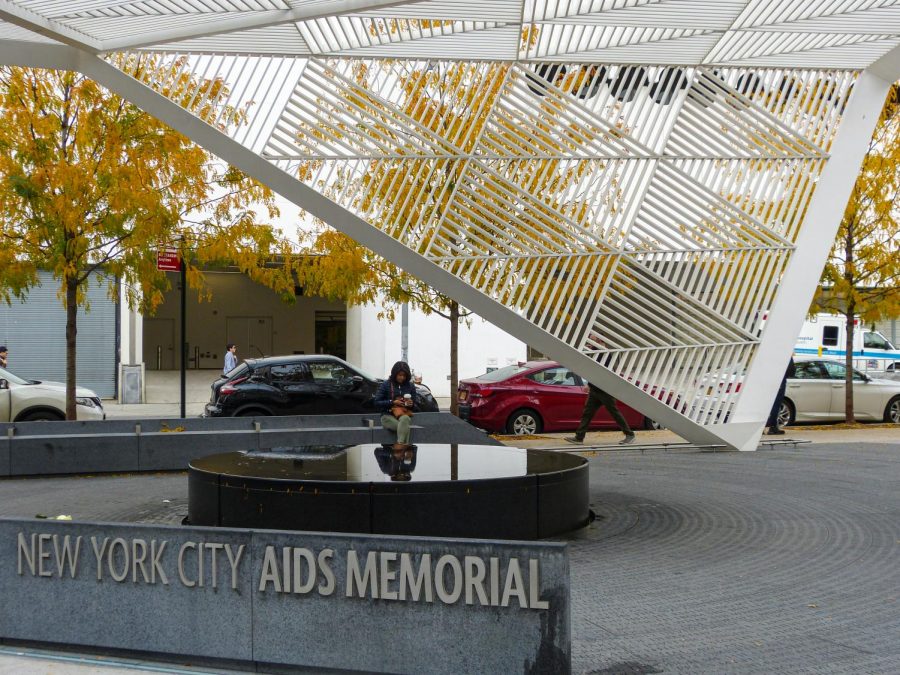The FDA’s Refusal to Allow Gay Men to Donate Blood is Blood-Boiling
LEV YAKOLEV/THE OBSERVER
The New York City AIDS Memorial in Greenwich Village is a testament to the lives lost during the AIDS epidemic.
October 30, 2019
In 2016, patrons of Pulse, the gay nightclub in Orlando, became the victims of one of the deadliest mass shootings in American history. As local blood banks urged residents to give blood to help the sudden demand for transfusions, some LGBTQ Floridians found themselves unexpectedly turned away, unable to donate.
In 1983, the Food and Drug Administration (FDA) banned any man who has had sex with another man, commonly abbreviated as MSM, from donating blood due to their elevated risk of contracting HIV. The new rule was put into place after several instances of people contracting HIV after receiving a blood transfusion from a person living with HIV or AIDS. In 2015, the FDA revised its rule from a lifetime ban to barring any man who has had sex with another man within a 12-month period. The FDA’s justification for the mandated 12-month period of celibacy is to improve the chances that a blood test can detect any strains of the virus, as all donated blood is screened through a series of rigorous tests that look for a variety of highly transmissible viruses. However, blood tests today are able to detect HIV with near perfect accuracy within 10 days of infection, and the chance of any infected blood making it past the screening is one in 3.1 billion. Why, then, must MSM be celibate for 12 months when their blood can be accurately tested within a fortnight?
As blood screening technology and medical treatments for HIV/AIDS continue to improve, the already shaky scientific foundation supporting the FDA regulation grows increasingly less convincing.
Heterosexual couples who engage in unprotected sex have a higher risk of contracting HIV, yet they are permitted to donate blood. Meanwhile, MSM who use contraception or are in long-term monogamous relationships are shackled to a year of celibacy to perform an act of generosity. If heterosexual couples who pose a higher risk than LGBTQ couples face no restrictions, then the ban has nothing to do with behavior. Rather, it has everything to do with the fact that MSM are exactly that — men who have sex with other men.
During the 1980s, the federal government hesitated to grant the Centers for Disease Control and Prevention and other health organizations the necessary funds for research on the causes, transmission and treatment of HIV/AIDS; Ronald Reagan did not acknowledge the crisis out loud until 1985. Some groups referred to the epidemic as the “gay plague,” believing that it was retribution against immoral groups such as the LGBTQ community as well as intravenous drug users and sex workers, two additional populations at high risk of contracting the virus.
Yet the U.S. cannot afford to turn away healthy and willing donors. According to the Red Cross, only 38% of Americans are eligible to donate blood or platelets and less than 10%, or about 6.8 million, of Americans actually do donate. The shelf life for donated blood is brief, and the U.S. has recently seen an increased need for a steady volunteer blood supply to support the estimated 4.75 million Americans who require blood transfusions each year. It is estimated that there are about 4 million gay or bisexual men in the United States, a number nearly equivalent with those in need of transfusions annually.
It is unreasonable and dangerous to turn away MSM who have a clean bill of health and whose blood undergoes the same screening as other donors. The policy not only prevents healthy blood from reaching the patients who desperately need it, but perpetuates the age-old stigma about the inherent dirtiness or unnaturalness of non-heterosexual relationships — a stigma that jeopardizes the safety of LGBTQ people each day. There’s a simple way to fix this: reduce the required celibacy period to one month. This meets the time demands of blood screening tests and guarantees the safety of those who donate and those whose lives are saved by their donations.
Although LGBT History Month is drawing to a close, LGBT Americans will not be able to move past the painful gaps in their history created by the AIDS epidemic come Nov. 1. The FDA’s policy is as clear of a reminder of the crisis as the memorials built downtown. It is unacceptable for a regulation motivated by homophobia to prevent gay or bisexual men from donating blood to the survivors of attacks motivated by homophobia such as Pulse. It’s time for us to call on the federal government to reverse its policy so that millions more Americans are eligible to donate blood — after all, silence equals death.










